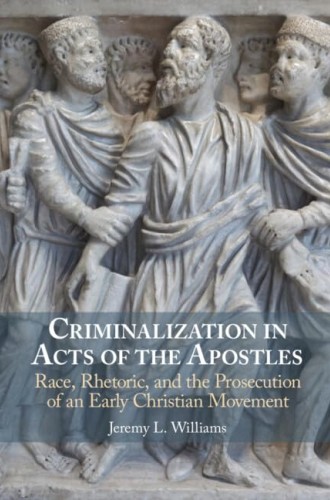The criminalized apostles
Jeremy Williams offers an indispensable study of the book of Acts and the rhetoric of crime in the Roman Empire.

Criminalization in Acts of the Apostles
Race, Rhetoric, and the Prosecution of an Early Christian Movement
The earliest followers of Jesus were not persecuted; they were prosecuted. This is the crucial point Jeremy Williams makes in Criminalization in Acts of the Apostles. While the distinction sounds subtle, it enacts an immense shift. The myth of Christian persecution by Rome persists in popular Christian imagination, despite scholarly consensus that such persecution was highly isolated (e.g., Candida Moss’s Ancient Christian Martyrdom). Prosecution emphasizes the rhetorical nature of criminal charges, which do not always result in incarceration or penalty. As a fictionalized narrative, Williams demonstrates, Acts retells the beginnings of the Jesus movement with specific rhetorical purposes—including how it represents the prosecution of this movement. Figures like Paul were not criminals; they were criminalized.
Like criminalization today, the rhetoric of crime in ancient Rome and its colonized land was racialized. Williams’s readings of Acts attest to how judicial prosecution, and especially Roman policing, created criminals from classes at the bottom of the empire’s hierarchy: foreigners and enslaved people. Unlike in the persecution myth, Roman prosecution did not single out Christians as a target. Roman elite interests associated the Jesus movement with broader groups that it made into criminalized targets. Williams shows how Acts both attests to this criminalization and presents it as false when it comes to leaders from the Jesus movement (but not other populations).
In the first part of the book, Williams creates a system to help readers approach the rhetoric of criminalization in ancient texts by engaging critical race theory and womanist and feminist scholarship. He proposes four categories of questions to ask about how texts criminalize people and shows interpreters how they can use these questions to analyze ancient texts. Williams’s analysis provides a rich picture of the system of criminalization in the Roman world of the second century CE, the rhetorical context for Acts. An awareness of this system of criminalization necessitates new translations of terms connected to Roman policing and imprisonment. Williams suggests “thug” in place of “bandit” (lēstas), “court” instead of “Sanhedrin” (sunēdrion), “sheriffs” for “magistrates” (stratēgoi), and “militarized police” as opposed to “soldiers” (stratiōtēs). These shifts better encapsulate the historical reality of Rome’s policed criminalization and help readers connect it to contemporary criminalizing language.




